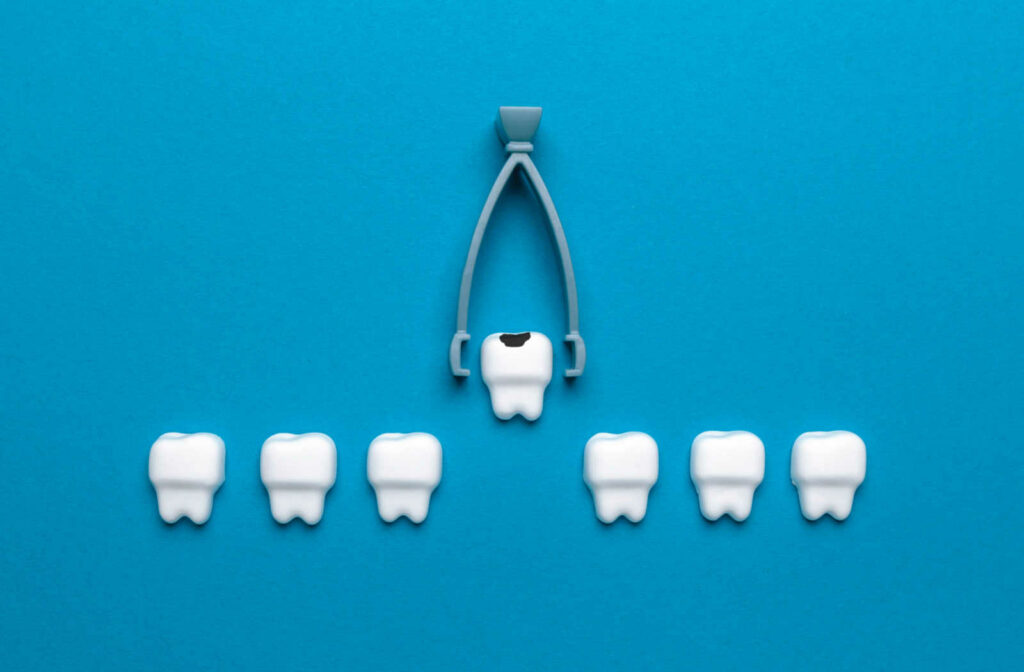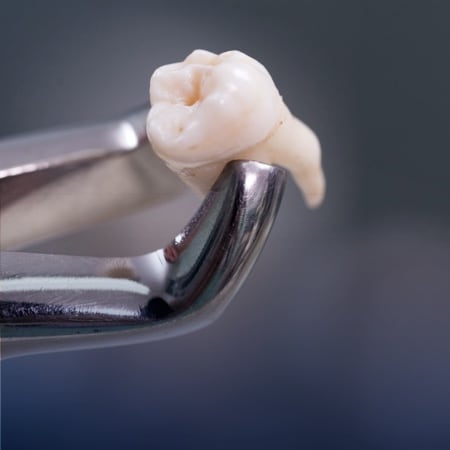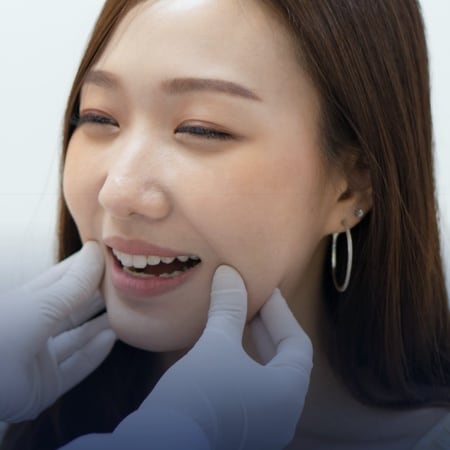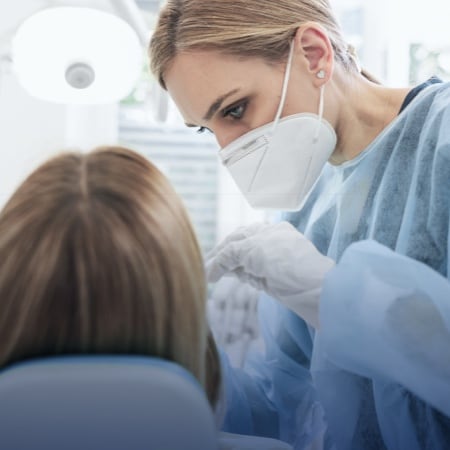A dentist may recommend visiting a trained oral surgeon for a tooth extraction if your tooth has significant problems or shows signs of serious decay. Periodontal disease typically describes infection or inflammation of the gums and bones that support the teeth.
Tooth extraction may be performed due to periodontal disease and the loosening of a tooth; however, it does not cure the disease.
At CVOS Oral Surgery, our highly trained dental surgeons are happy to discuss the different treatments we can offer patients or referring dentists.
Will a Tooth Extraction Cure Periodontal Disease?
Periodontal disease affects the gums and not the teeth. Therefore, it is unlikely that extracting your tooth will solve the problem. An extraction may be included in the treatment plan but is not likely to be responsible for resolving it.
For example, If your gums have become significantly damaged from periodontal disease, the surrounding bone may develop problems that affect your teeth, like the gums receding and loosening a tooth.
In that case, your dentist may examine the affected area when assessing for gum disease and recommend a treatment plan, including a referral to book an appointment with an oral surgeon.
What Is Periodontal Disease?
Periodontal disease, otherwise known as gum disease or periodontitis, is a gum infection that damages the soft tissue in your mouth. Without proper treatment, it can loosen your teeth or result in the need for a tooth extraction.
Periodontitis is common and can be prevented with proper oral hygiene. Regular brushing, flossing, and visiting your dentist for appointments can help to avoid the problem.
Healthy gums are typically pale pink and will tightly sit around your teeth. When experiencing gum disease, they may change in appearance and exhibit some of the following symptoms:
- Swelling and puffiness in your gums
- Your gums may be bright red or purple
- Tenderness and some discomfort
- Your gums may bleed easily and more frequently
- Pus between your teeth and gums
- Bad breath
- Discomfort when chewing and eating
- Your teeth may feel loose
- Spaces developing between your teeth
- Gums that recede from your teeth
Speak with your oral healthcare provider if you are experiencing any of these symptoms to discuss the next steps toward a healthy and happy smile.
What Causes Periodontal Disease?
Periodontal disease is typically caused due to plaque buildup on your teeth. Poor oral hygiene and improper brushing and flossing are common culprits of plaque formation. Plaque that is not removed will eventually harden, causing your gums to feel irritated and increasing your chance of having periodontal disease.
Gum disease progresses in a few stages:
- Plaque formation: Plaque forms when sugars and starches in the food you eat rest on your teeth, mixing with bacteria in the mouth. Daily brushing is necessary to remove plaque as it can reform quickly.
- Plaque hardens under the gumline: If plaque stays on the teeth too long, it hardens into tartar, which is harder to remove and full of bacteria. Tartar typically requires professional cleaning from a dentist to be removed.
- Plaque causes gingivitis: Plaque & tartar eventually cause gingivitis, the mildest form of gum disease.
- Gum inflammation causes periodontitis: Continued inflammation eventually causes pockets to develop between the gums and teeth, filling with bacteria, plaque, and tartar. These pockets become deeper and, without treatment, can lead to significant complications.
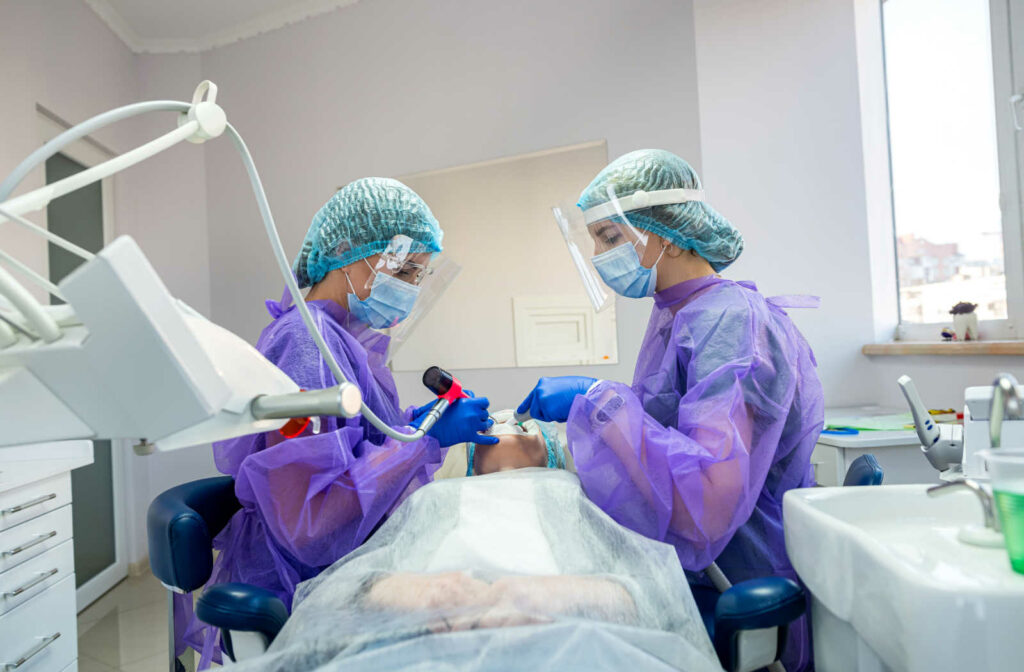
What Is a Tooth Extraction?
A tooth extraction typically involves having a trained oral surgeon remove a tooth from your mouth for medical reasons. For example, removing your wisdom teeth is a commonly performed type of tooth extraction.
Some of the reasons you might require a tooth extraction include:
- Tooth decay
- Infection
- Damage to your tooth
- Periodontal disease
It is recommended to have your tooth extraction performed by an oral surgeon, as they have been specifically trained to perform dental surgeries and are qualified to treat surgical issues ranging from the neck to the lower skull.
How is a Tooth Extraction Performed?
The complexity of tooth extraction will depend on the tooth and if it is visible or impacted. For example, a simple extraction may be done by a regular dentist as it typically implies using local anesthesia to numb the area around your tooth and then a specialized tool to loosen and remove it.
In contrast, surgical tooth extraction is typically more challenging and should be done by a trained oral surgeon. In most cases, it involves using local or general anesthesia that has you unconscious for the procedure. Following this, your dental surgeon may remove the tooth by cutting the gums, removing bones, or whatever treatment plan is necessary to extract the tooth properly.
We recommend contacting our team at CVOS Oral Surgery or asking your dentist for a referral to ensure that your extraction is performed by an experienced dental surgeon.
Expert Oral and Maxillofacial Treatment at CVOS
Your dentist may help identify problems and perform regular cleanings, but it is important to speak with an oral surgeon when it comes to surgical procedures.
Ask your dentist for a referral, or contact us directly at CVOS Oral Surgery if you are experiencing signs of gum disease or other dental-related problems that may require surgical intervention.


